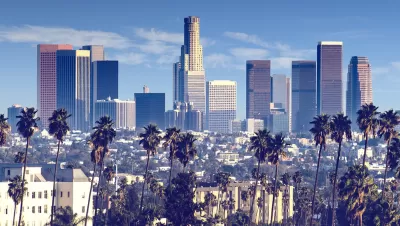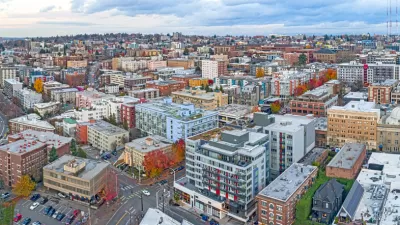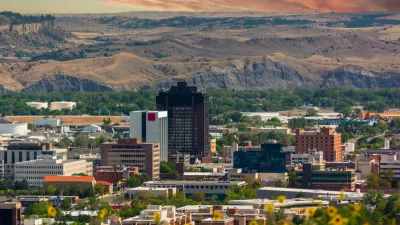In famously car-centric Los Angeles, developers and city officials are changing the way they view parking space, opting instead to allocate the space to more effective uses.

With the pandemic forcing cities and businesses to repurpose parking for uses like outdoor dining and seating, writes Mark Hallum, policymakers and developers are rethinking the value of parking spaces and potential alternate uses for surface parking and parking structures. Meanwhile, "emerging business models and technology, from electric vehicle charging stations to ghost kitchens, have made the humble parking stall, a mere 300 square feet, more useful, and more contested, space."
In a quote in the article, Michael Manville, an associate professor of urban planning at the University of California, Los Angeles, says, "The pandemic gave everyone this very vivid illustration of how much space, even in very vibrant parts of their area, is devoted to surface parking." Hallum mentions some high-profile garage redevelopments that illustrate the possibilities for adapting parking to other uses.
"In downtown L.A., where adaptive reuse and residential construction has boomed in recent years — a city ordinance allows builders to get properties to market quicker, and does not require them to add net new parking — Markwood’s 9th & Hill turned the historic May Company Garage into a high-end office building with a location of the ultra-high-end grocery chain Erehwon. In Santa Monica, the city is pushing to transform a downtown parking structure into up to 150 units of affordable housing, a plan that has drawn unexpectedly fierce local sentiment in favor of protecting the outdated concrete structure."
Hallum calls parking "a long-term infill opportunity" that could change the car-centric character of Los Angeles, writing that, while the built environment of L.A. and its relationship with cars and parking won't change overnight, "the last few years did provide brief glimpses of a future where car-centric infrastructure is reimagined and redeveloped, which may be enough to catalyze a significant real estate shift."
FULL STORY: Los Angeles Rethinks Parking

Maui's Vacation Rental Debate Turns Ugly
Verbal attacks, misinformation campaigns and fistfights plague a high-stakes debate to convert thousands of vacation rentals into long-term housing.

Planetizen Federal Action Tracker
A weekly monitor of how Trump’s orders and actions are impacting planners and planning in America.

In Urban Planning, AI Prompting Could be the New Design Thinking
Creativity has long been key to great urban design. What if we see AI as our new creative partner?

California Creates Housing-Focused Agency
Previously, the state’s housing and homelessness programs fell under a grabbag department that also regulates the alcohol industry, car mechanics, and horse racing.

Chicago’s Ghost Rails
Just beneath the surface of the modern city lie the remnants of its expansive early 20th-century streetcar system.

Baker Creek Pavilion: Blending Nature and Architecture in Knoxville
Knoxville’s urban wilderness planning initiative unveils the "Baker Creek Pavilion" to increase the city's access to green spaces.
Urban Design for Planners 1: Software Tools
This six-course series explores essential urban design concepts using open source software and equips planners with the tools they need to participate fully in the urban design process.
Planning for Universal Design
Learn the tools for implementing Universal Design in planning regulations.
planning NEXT
Appalachian Highlands Housing Partners
Mpact (founded as Rail~Volution)
City of Camden Redevelopment Agency
City of Astoria
City of Portland
City of Laramie





























